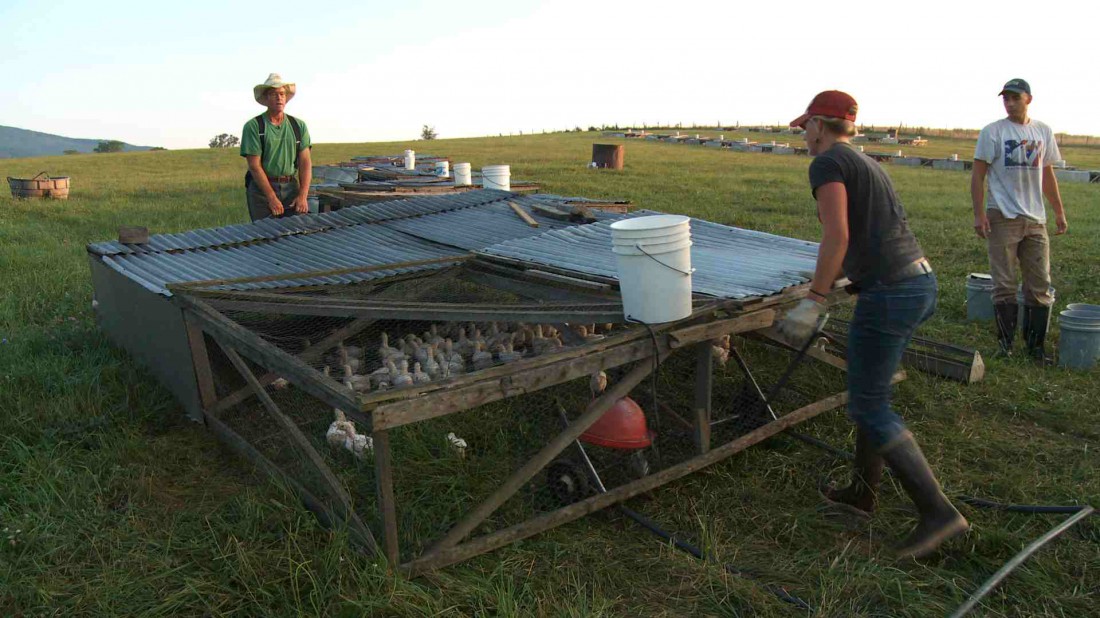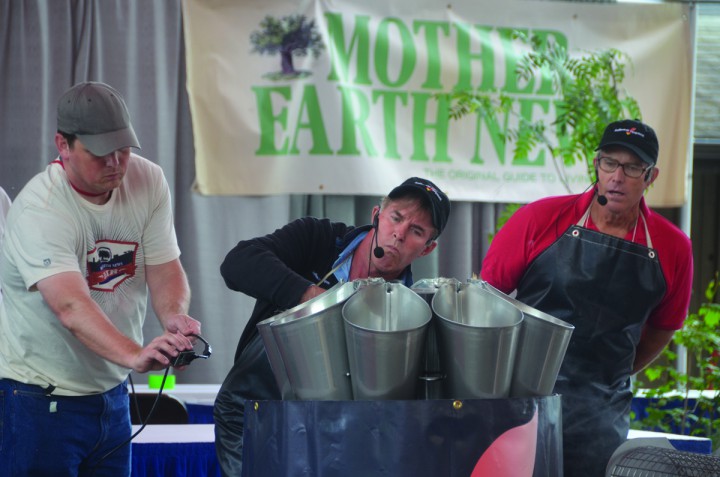Last weekend offered a whirlwind of events for the area’s food and environmentally conscious citizens, including multiple chances to see the “Lunatic Farmer” himself, Joel Salatin of Polyface Farms. Salatin has risen to notoriety through his appearances in Michael Pollan’s book, The Omnivore’s Dilemma and through his film appearances in Food, Inc. and Farmaggedon. He was featured as one of the keynote speakers at the Mother Earth News Fair and was hosted by the Ashevillage Institute to present as part of UNC Asheville’s Greenfest.
Salatin delivered his message to a standing room only crowd at UNCA’s Humanities Lecture Hall. His lecture focused on what we might see if we were to observe the United States some 500 years ago and what those observations could tell us about our current agricultural systems. Among the changes he called into question is the aversion to seeing agriculture, specifically animals, in cities and urban areas. Salatin pointed out that our tendency to separate and compartmentalize ecological systems, rather than create fully functional systems that take advantage of ecological synergies, is responsible for the detachment and destruction we see under conventional agriculture.
Salatin’s first event on Sunday at the Mother Earth News Fair took things in a slightly different direction as he and David Schafer of Featherman Equipment conducted a live poultry processing demo on the fair’s main stage. Despite the event’s early time slot and its somewhat gruesome subject matter, Salatin managed to once again draw an impressive crowd. Schafer and Salatin showed the audience how poultry could be humanely dispatched and efficiently processed for consumption using chickens raised on the Warren Wilson College farm. There was no shortage of questions from the audience, and both Salatin and Schafer answered each question with wit and humor.
I was lucky enough to get to sit down with Salatin following the poultry processing demonstration to present him with some questions regarding his ideas on agriculture and our food system.
The Mountain Xpress: As people are trying to return to some of the self-reliance techniques you see here at the Mother Earth News Fair, what do you think is the most important area for people to focus on?
Salatin: I think it requires a profound understanding that if we are going to change our world, we personally have to become involved with it. I think too often we just assume that things can change if someone else acts responsibly. The bottom line is that our problems are not going to be solved by pointing fingers at someone else. This is going to be solved by looking in the mirror and saying, “Okay what am I doing today to create integrity in our world?” It may mean changing jobs; it may mean building a cistern on your house; it may mean planting a garden; it may mean getting rid of the television; it may mean ferreting out your local food sources and taking cooking classes.
The point is that it starts by understanding that the future that we have will be the manifestation of individual decisions that you and I make until we get there. Once we fully embrace that it is not about finger pointing, and that it is actually about us being the change that we want to see … once we realize that, then we get somewhere
At the Ashevillage event, you spoke about the fact that bureaucracy perpetuates the status quo down to a local level. What are some of the problems that you see with local laws that inhibit self-reliance and agriculture?
One is certainly zoning, where we segregate our economic sectors. We segregate residential, commercial, manufacturing, etc. I see a fundamentally integrated economic system where we actually live where we work or where our shops are, and we grow things where we live. What this means is that we have to quit being such elitists. We have rules against having clotheslines because it implies that someone cannot afford a washer and dryer. We have rules against having chickens in cities because brown people and weirdos do that. We think that “C” students and “D” students are the ones that can play in the dirt. We have a very condescending stereotype in our culture toward people who farm and participate in the food system.
Local laws and protocols are all symptomatic of a nonparticipatory, segregated food production paradigm. We have a system where it is agriculturally appropriate to have a chemical storage facility on your farm to spray chemicals, but it is not agriculturally appropriate to have housing for more farm workers on your farm so you do not have to use the chemicals. This is an example of how local zoning requirements militate against the shift that the entire system needs to see in order to move it forward.
Interestingly, the enemies of the farm workers on the farm are equally industrialist as well as environmentalist. The radical environmentalists see the farm as green space, so we cannot have people living there, we cannot have sawmills, we cannot have manufacturing. They segregate every economic sector finely so that you cannot have a multidimensional, integrated approach to stewardship.
In a nutshell, can you give me an idea of what your ideal future would look like regarding agriculture and farming?
I don’t know what it will look like because I’m not a prophet, but I can tell you what I would like to see. I would like to see a system that has nutrient dense food rather than nutrient deficient food; a system that builds soil rather than eroding soil; a system that purifies water rather than polluting it; a system that involves way more people farming, rather than less people farming, and where far more consumers participate in, rather than abandon, the system.
With regards to the idea of scale and changing the current agricultural system, you have people trying to make changes in their own backyard escalating all the way up to farms as large as your own; how do you feel these different scales of responses integrate with one another?
Generally speaking, the more nutrient density and the less water in food, the more you can justify shipping it. For example, a pound of beef contains far more nutrients than a pound of cabbage. So, if you think about transportation from a density standpoint, we need to be growing our lettuces and greens and spinach either in-house or very proximate to where they are being consumed. The items like cheese and beef, the more nutrient dense items, can be transported longer distances.
It is similar to the idea of zones in permaculture. In terms of incorporating these responses to conventional agriculture into the supermarket system, I don’t see a place for the supermarket. I see us moving toward electronic aggregation, with services like Amazon, Craigslist, etc., in which the retail interface does not have to be a brick and mortar interface. When you change that interface, it changes the overhead, energy and capitalization requirements of that interface.
I do not see that the food system that we have is something that those of us trying to make changes should try to fit into; rather we should create a brand new food system that has a lot of components that look like something we would have seen eighty years ago, while at the same time embracing technology that has enabled Wal-Mart to exist. The electronic technology that enables Wal-Mart to be global also allows incredible efficiencies in local electronic aggregation.
You’ve been in your fair share of documentaries. If people are looking for a starting place in terms of learning about changing our food system, would you recommend any one movie over the other?
I’d recommend Fresh. Food, Inc. is clearly the most well-known, but I find that it can be somewhat depressing; and I don’t think we need to be depressed. Fresh, on the other hand, has a balance regarding what is wrong, but you leave it empowered with what you can do to change things. If you are not sure where you stand on all this, I think American Meat is a good start for a person that really isn’t ready to embrace this approach. If you want to be encouraged, watch Fresh; if you have drunk the Kool Aid and are ready to go the next level, I think Farmageddon will rock your world.





Before you comment
The comments section is here to provide a platform for civil dialogue on the issues we face together as a local community. Xpress is committed to offering this platform for all voices, but when the tone of the discussion gets nasty or strays off topic, we believe many people choose not to participate. Xpress editors are determined to moderate comments to ensure a constructive interchange is maintained. All comments judged not to be in keeping with the spirit of civil discourse will be removed and repeat violators will be banned. See here for our terms of service. Thank you for being part of this effort to promote respectful discussion.